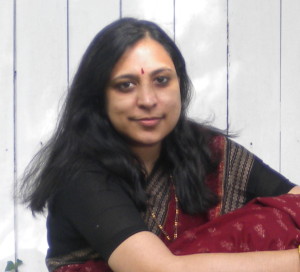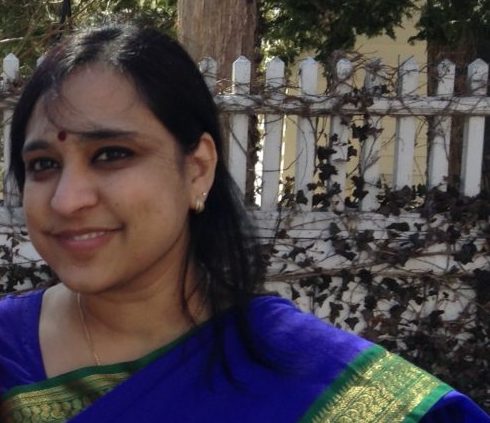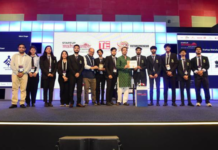BELMONT, MA—Anu Chitrapu, a senior Bank of America executive and columnist for INDIA New England News, and her two sisters have launched Nyrvaana (pronounced as ‘Nirvana’), a social enterprise to save fabric from landfills.
“It all started when the floods hit Chennai in December of 2015. Many of our friends and family talked about how their old silk sarees were destroyed beyond repair,” says Chitrapu, a resident of Belmont, MA. “When we saw the beautiful, hand woven borders on silk and cotton sarees that could never be worn again that was the moment Nyrvaana came into being as a spark in our eyes. It took us over a year to figure out how exactly we could save hand woven, natural fabric from being lost in landfill.”

Chitrapu is a Senior Vice-President and Executive at Bank of America. She has won awards at the bank for exceptional performance, and is the executive sponsor for the Boston chapter of the Asian Leadership Network. She is also on the advisory board of Saheli, an organization that empowers South Asian women, and has served as the gala chair for their fundraiser Nirbhaya. She serves as treasurer of DAWN (Direct Action for Women Now), a Boston based non-profit that seeks to end gender based violence. Chitrapu holds an MBA from MIT’s Sloan School of Management.
How does it work Nyrvaana work?
“First came the jewelry pouches. We cut the unusable sarees into small pieces and then attached borders from other sarees. The beauty of kancheevaram silk came to life once again, in a new avatar, when we attached the borders to pieces of fabric salvaged from old clothing, kurtas and dupattas,” said Chitrapu. “After perfecting the pouch design, we became more ambitious – why let bedsheets and curtains go to waste? We tried and tested grocery bags made with these. We bought fabric from the surplus market in Chennai and lined it with an old curtain and, lo and behold, that became a strong, reusable shopping bag!”
Chitrapu said that her team did not want to throw away the thin saree fabric that could be used … so they came up with the design for lightweight jholas. These are very similar to the traditional jholas one would see hanging on the shoulders of students in India in the 70s and 80s.
 “We wanted to bring them back into the limelight. So we created light jholas and sturdy book jholas and were thrilled to find some professors in India wanting them,” Chitrapu said. “We have come a long way but have a much longer way to go.”
“We wanted to bring them back into the limelight. So we created light jholas and sturdy book jholas and were thrilled to find some professors in India wanting them,” Chitrapu said. “We have come a long way but have a much longer way to go.”
She says her goals are twofold : first, save natural fabric from ending up in a landfill, and second, to provide employment for women by having all the sewing done by women.
“A hundred percent of profits from Nyrvaana are used to support women. Using profits from our first batch of pouches, which completely sold out, we supported various women-focused causes, including buying a cycle for a young girl in Chennai who is now empowered with wheels,” said Chitrapu. “We provided pouches for women undergoing treatment for cancer – the pouches hold a lip balm, mints and aloe cream. In addition, we sponsor bags for fundraisers and any events that support causes for women.”
For more information, visit Nyrvaana online store at www.nyrvaana.com or email at nyrvaana1@gmail.com for any custom orders.
“And whether you shop at Nyrvaana or not, please do save fabric from landfill by following the principle of reduce, reuse, recycle,” Chitrapu advises.
Nyrvaana is a social enterprise founded by Chitrapu and her sisters, Padma Chitrapu and Subbayama Chitrapu. The inspiration for Nyrvaana came from their mother Satyavathi Chitrapu who came up with the idea of making bags with used fabric.






